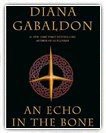Outlander aka Cross Stitch - Gabaldon Diana (читать книгу онлайн бесплатно полностью без регистрации .TXT) 📗
“Now the young lad ye brought with ye,” she went on, nodding in approval, “there’s one that’s had a few love-philtres bought on his behalf. Is he yours?”
“Mine? Who? You mean, er, Jamie?” I was startled.
The young woman looked amused. She sat down on a log, twirling a lock of fair hair idly around her index finger.
“Och, aye. There’s quite a few would settle for a fellow wi’ eyes and hair like that, no matter the price on his head or whether he’s any money. Their fathers may think differently, o’ course.
“Now, me,” she went on, looking off into the distance, “I’m a practical sort. I married a man with a fair house, a bit o’ money put away, and a good position. As for hair, he hasn’t any, and as for eyes, I never noticed, but he doesna trouble me much.” She held out the basket she carried for my inspection. Four bulbous roots lay in the bottom.
“Mallow root,” she explained. “My husband suffers from a chill on the stomach now and again. Farts like an ox.”
I thought it best to stop this line of conversation before things got out of hand. “I haven’t introduced myself,” I said, extending a hand to help her up from the log. “My name is Claire. Claire Beauchamp.”
The hand that took mine was slender, with long, tapering white fingers, though I noticed the tips were stained, probably with the juices of the plants and berries resting alongside the mallow roots in her basket.
“I know who ye are,” she said. “The village has been humming with talk of ye, since ye came to the castle. My name is Geillis, Geillis Duncan.” She peered into my basket. “If it’s balgan-buachrach you’re looking for, I can show you where they grow best.”
I accepted her offer, and we wandered for some time through the small glens near the orchard, poking under rotted logs and crawling around the rim of the sparkling tarns, where the tiny toadstools grew in profusion. Geillis was very knowledgeable about the local plants and their medicinal uses, though she suggested a few usages I thought questionable, to say the least. I thought it very unlikely, for instance, that bloodwort would be effective in making warts grow on a rival’s nose, and I strongly doubted whether wood betony was useful in transforming toads into pigeons. She made these explanations with a mischievous glance that suggested she was testing my own knowledge, or perhaps the local suspicion of witchcraft.
Despite the occasional teasing, I found her a pleasant companion, with a ready wit and a cheerful, if cynical, outlook on life. She appeared to know everything there was to know about everyone in village, countryside, and castle, and our explorations were punctuated by rests during which she entertained me with complaints about her husband’s stomach trouble, and amusing if somewhat malicious gossip.
“They say young Hamish is not his father’s son,” she said at one point, referring to Colum’s only child, the red-haired lad of eight or so whom I had seen at dinner in the Hall.
I was not particularly startled by this bit of gossip, having formed my own conclusions on the matter. I was only surprised that there was but one child of questionable parentage, surmising that Letitia had been either lucky, or smart enough to seek out someone like Geilie in time. Unwisely, I said as much to Geilie.
She flung back her long fair hair and laughed. “No, not me. The fair Letitia does not need any help in such matters, believe me. If people are seeking a witch in this neighborhood, they’d do better to look in the castle than the village.”
Anxious to change the subject to something safer, I seized on the first thing that came to mind.
“If young Hamish isn’t Colum’s son, whose is he supposed to be?” I asked, scrambling over a heap of boulders.
“Why, the lad’s, of course.” She turned to face me, small mouth mocking and green eyes bright with mischief. “Young Jamie.”
Returning to the orchard alone, I met Magdalen, hair coming loose under her kerchief and wide-eyed with worry.
“Oh, there ye are,” she said, heaving a sigh of relief. “We were going back to the castle, when I missed ye.”
“It was kind of you to come back for me,” I said, picking up the basket of cherries I’d left in the grass. “I know the way, though.”
She shook her head. “You should take care, my dearie, walking alone in the woods, wi’ all the tinkers and folk coming for the Gathering. Colum’s given orders-” She stopped abruptly, hand over her mouth.
“That I’m to be watched?” I suggested gently. She nodded reluctantly, clearly afraid I would be offended. I shrugged and tried to smile reassuringly at her.
“Well, that’s natural, I suppose,” I said. “After all, he’s no one’s word but my own for who I am or how I came here.” Curiosity overcame my better judgment. “Who does he think I am?” I asked. But the girl could only shake her head.
“You’re English,” was all she said.
I didn’t return to the orchard next day. Not because I was ordered to remain in the castle, but because there was a sudden outbreak of food poisoning among the castle inhabitants that demanded my attention as physician. Having done what I could for the sufferers, I set out to track the trouble to its source.
This proved to be a tainted beef carcass from the slaughter shed. I was in the shed next day, giving the chief smoker a piece of my mind regarding proper methods of meat preserving, when the door swung open behind me, sending a thick wave of choking smoke over me.
I turned, eyes watering, to see Dougal MacKenzie looming through the clouds of oakwood smoke.
“Supervising the butchering as well as the physicking, are ye now, mistress?” he asked mockingly. “Soon ye’ll have the whole castle under your thumb, and Mrs. Fitz will be seeking employment elsewhere.”
“I have no desire to have anything to do with your filthy castle,” I snapped, wiping my streaming eyes and coming away with charcoal streaks on my handkerchief. “All I want is to get out of here, as fast as possible.”
He inclined his head courteously, still grinning. “Well, I might be in a position to gratify that wish, mistress,” he said. “At least temporarily.”
I dropped the handkerchief and stared at him. “What do you mean?”
He coughed and waved a hand at the smoke, now drifting in his direction. He drew me outside the shed and turned in the direction of the stables.
“You were saying yesterday to Colum that ye needed betony and some odd bits of herbs?”
“Yes, to make up some medicines for the people with food poisoning. What of it?” I demanded, still suspicious.
He shrugged good-naturedly. “Only that I’m going down to the smith’s in the village, taking three horses to be shod. The fiscal’s wife is something of an herb-woman, and has stocks to hand. Doubtless she has the simples that you’re needing. And if it please ye, lady, you’re welcome to ride one of the horses down wi’ me to the village.”
“The fiscal’s wife? Mrs. Duncan?” I immediately felt happier. The prospect of escaping the castle altogether, even if only for a short time, was irresistible.
I mopped my face hurriedly and tucked the soiled kerchief in my belt.
“Let’s go,” I said.
I enjoyed the short ride downhill to the village of Cranesmuir, even though the day was dark and overcast. Dougal himself was in high spirits, and chatted and joked pleasantly as we went along.
We stopped first at the smith’s, where he left the three extra horses, taking me up behind him on his saddle for the trip up the High Street to the Duncans’ house. This was an imposing half-timbered manor of four stories, the lower two equipped with elegant leaded-glass windows; diamond-shaped panes in watery tones of purple and green.
Geilie greeted us with delight, pleased to have company on such a dreary day.
“How splendid!” she exclaimed. “I’ve been wanting an excuse to go through the stillroom and sort out some things. Anne!”



